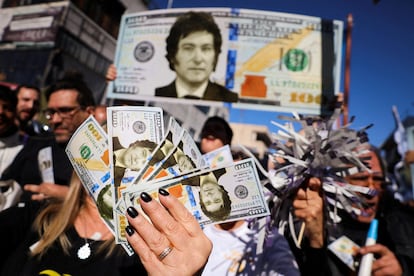The Argentine peso crashes amid a fiery electoral campaign
This week’s currency worries have an unprecedented feature: the favorite candidate in the polls, the far-right Javier Milei, has exacerbated it by recommending that the public get rid of their pesos because they are not worth ‘excrement’


With less than two weeks until the general elections, the Argentine economy has begun to melt down. The first collapse came in the exchange rate: for every dollar, banks and currency exchanges asked for 1,010 pesos on the streets of Buenos Aires this Tuesday. On Monday the price was 945, and on Friday, a dollar cost 870 pesos. There is a residual black market where these operations are carried out, and Argentines consider it a barometer of the health of their economy. Although they are accustomed to economic fears rising in times of great uncertainty, such as on the eve of elections, passing the 1,000-peso mark this Tuesday warns of a serious illness that might send the country back to the worst crises in its history.
This week’s currency worries have an unprecedented feature: the favorite candidate in the polls, the far-right Javier Milei, has exacerbated it by recommending that the public get rid of their pesos because they are not worth “excrement.” “Today more than ever, do not save in pesos,” reiterated Milei’s candidate for mayor of Buenos Aires, the financial YouTuber Ramiro Marra. His statements have been criticized as irresponsible by politicians, economists, and even businessmen. The private banks have come out en masse to ask the presidential candidates for moderation and to demand that they avoid “making unfounded statements that generate uncertainty in the people and volatility regarding financial variables.”
Milei’s main rivals in the electoral race, Economy Minister Sergio Massa and conservative candidate Patricia Bullrich, have accused him of setting the country on fire to win votes. However, the currency run places them on opposite sides of the issue. Massa is aware that the depreciation of the Argentine currency reveals the extreme fragility of an economy flooded with pesos that no one wants. Second in the polls, he knows that he needs to regain control as soon as possible if he wants to stay in the race for the Casa Rosada. Bullrich, on the contrary, believes that the sudden economic deterioration offers her an opportunity to attack her two rivals at the same time to recover lost support and compete in the second round on November 19. This will take place if none of the candidates wins 45% of the vote on October 22, or more than 40% with ten points between them and the next candidate.
“Argentina’s situation is extremely fragile,” warns economist Elisabet Bacigalupo, head of the macroeconomic team at the consulting firm Abeceb. “The underlying issue is the weak condition of the Argentine economy, added to which are the statements by a candidate who could be president, saying that it is advisable to exchange pesos for dollars and that saving in pesos is equivalent to excrement. This enhances uncertainty and the rise of alternative dollars,” adds Bacigalupo.
“People don’t want to have pesos, they’re running away from pesos and that is causing a lot of damage to the economy because of the way it affects inflation,” says Salvador Vitelli, from the Romano Group consulting firm. This Thursday, the consumer price index (CPI) data for September will be known, but it will already be out of date. Many businesses stopped selling in the last few hours due to lack of accurate prices while others were preparing to increase them.
‘We saw it coming’
The next president will inherit a country standing over the abyss, with runaway inflation, a large external debt in dollars, a fiscal deficit, and central bank reserves in the red. “Faced with those who deepen the crisis as Minister of Economy [Massa], and against those who scare Argentines [Milei], we are willing to take the reins of the country from the point where they have left it,” Bullrich said at a press conference this Tuesday. The candidate canceled her campaign events to appear before the media alongside economist Carlos Melconián, who will be the head of the Treasury if the Together for Change candidate comes to power. “We saw it coming. The only thing Massa is doing is deepening the crisis. He speculated that this was going to happen after October 22,” said Bullrich, positioning the minister-candidate as the number one person to blame for the crisis.
Milei joined the criticism of the conservative leader. “The Kirchner government of Alberto Fernández, Cristina Kirchner, and Sergio Massa must take charge of the economic disaster they have caused. Issuing freely to finance exorbitant public spending with which the Insaurraldes [Peronist politician accused of corruption] of this world live like kings has consequences and all good Argentines are paying for them,” Milei said on social media.
Milei remains firm in his decision to dollarize the Argentine economy in order to “exterminate inflation,” even though his own team does not agree on the viability of carrying out this plan in a country without dollars in the central bank or credit on the international markets.
Although the official price has remained fixed at 365 pesos per dollar since August, the government devalued it in several parallel exchange rates early on Tuesday to reduce demand. It didn’t work: exchange rates with less official intervention continued their climb. In the afternoon, Minister Massa tried to look for blame outside the government. He accused “four or five rogues” of being behind the exchange rate run in recent days and assured that, whether he wins or loses the election, he will ensure that they are criminally prosecuted and go to prison. His promise was received with little enthusiasm by a populace that wants solutions so as not to wake up poorer every day.
Sign up for our weekly newsletter to get more English-language news coverage from EL PAÍS USA Edition
Tu suscripción se está usando en otro dispositivo
¿Quieres añadir otro usuario a tu suscripción?
Si continúas leyendo en este dispositivo, no se podrá leer en el otro.
FlechaTu suscripción se está usando en otro dispositivo y solo puedes acceder a EL PAÍS desde un dispositivo a la vez.
Si quieres compartir tu cuenta, cambia tu suscripción a la modalidad Premium, así podrás añadir otro usuario. Cada uno accederá con su propia cuenta de email, lo que os permitirá personalizar vuestra experiencia en EL PAÍS.
¿Tienes una suscripción de empresa? Accede aquí para contratar más cuentas.
En el caso de no saber quién está usando tu cuenta, te recomendamos cambiar tu contraseña aquí.
Si decides continuar compartiendo tu cuenta, este mensaje se mostrará en tu dispositivo y en el de la otra persona que está usando tu cuenta de forma indefinida, afectando a tu experiencia de lectura. Puedes consultar aquí los términos y condiciones de la suscripción digital.








































